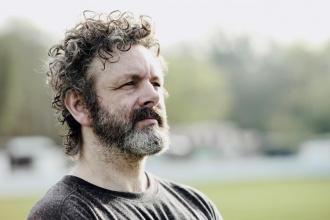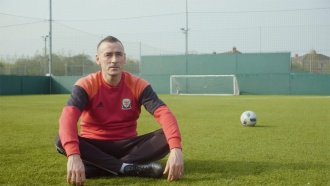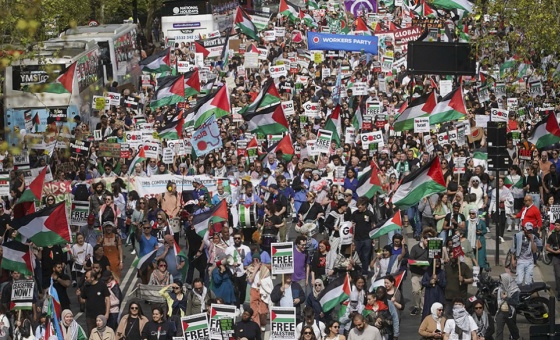This is the last article you can read this month
You can read more article this month
You can read more articles this month
Sorry your limit is up for this month
Reset on:
Please help support the Morning Star by subscribing here
ONCE in a very blue moon, there are ideas which are either bafflingly bonkers or stunningly brilliant. The notion that the game of association football could help end global homelessness might be both.
It’s an idea which took hold in 2001 and has survived and thrived in the form of the Homeless World Cup. This year, it’s come to Cardiff and kicks off this weekend at the city’s beautiful Bute Park.
Leading the bid to bring the tournament to Wales’ capital city was a local boy, now known almost as much for his altruism but recognisable to many as Tony Blair, Kenneth Williams, Aro in the Twilight Saga and the Prince of Denmark.
Michael Sheen, born in Newport and brought up in Port Talbot, has brought as much hwyl [Welsh for passion] to getting this event as he has to his stellar acting career.

The Homeless World Cup was co-founded by Mel Young and Harald Schmied, who’d both edited street newspapers, Young in Scotland and Schmied in Germany.
Young says the notion popped up during a beer at a conference about homelessness. Two years later, the first tournament took place.
It’s already a spectacle, with giant flags and banners decorating the main streets. Sheen has done a gruelling round of media interviews and chat shows, sometimes talking about the event whether he’s asked or not. He is on a mission to use his fame to push for social change, but dismisses talk of activism. “I don‘t even know what to call it — what I do. I call it ‘the non-acting stuff’.”
He had a great grasp of the extent of the problems. “A lot of people have the idea that solving homelessness is about getting people off the streets and into buildings. It is so, SO much more complex than that.”
He’ll grab whatever media attention is available, as well as meeting with local government, charities, professionals and those with experience of being homeless.
So, how to translate these 10 days of visibility into real change?
“That’s the challenge. After years of austerity measures, years of budgets being cut, benefits being cut … we have to have a shared strategic goal.
“Some people [working in the sector] are incentivised to not work together — they’re scared to share information, resources, expertise. That does not make for good collaboration. Funding has been cut and cut again, so they’re all after the same smaller pot of money.”
That said, Sheen has plenty of praise for those he’s working with. “I’ve not met a single person and thought: ‘Oh, they’re trying to mess this up for other people.’ There are lots of fantastic people working incredibly hard on these issues. You realise that it is the system that is flawed.”
He sees the tournament as “a way of getting people having the same conversation — even if it’s one with raised voices!”
And football — especially a free tournament — is a lure. “The number of people who would come to a homelessness conference would be very small, but they’ll come for football.”

This event is no charity kickabout in the park. There are 500 players, making up 64 teams [48 men’s and 16 women’s] from nearly 50 countries. There’s a grand parade and, when the matches start, they’ll go at a cracking pace, with each half seven minutes and a lightning one minute interval.
There’s a festival feel to the whole thing, with music from Welsh acts James Dean Bradfield and Gwenno, comedy from Sara Pascoe, debates on tough topics including human trafficking, slavery and Justice4Grenfell. Activist and musician Charlotte Church ran a Late Night Pop Dungeon last night.
Charities have been involved, though some to a greater degree than others. Cymorth Cymru is the umbrella body for some 90 service providers in the sector, and director Katie Dalton has been working on the event for eight months.
She and her team have a list of demands for the Welsh and UK governments: more social housing — that’s a given — but also reducing waiting times for universal credit, and scrapping the punitive Vagrancy Act.
She also hopes for more compassion and understanding from the public and asks businesses to oppose hostile architecture — spikes in doorways, benches where it’s impossible to lie down.
There are differences of opinion on some of this detail. Cardiff is not alone in having “street ambassadors,” small teams who work for initiatives funded by business. In the Welsh capital, this is five staff employed by FOR Cardiff, who can be spotted in their red polo tops embroidered with “Here to Help.”
Ask those people on the streets, though, and there’s precious little help. David, who sits in a sweltering spot, says that many are being banned from the city centre for 48 hours. He knows the law and tries to keep some small change in his pocket. “They shouldn’t be able to do you for vagrancy, in that case, but that doesn’t mean anything to this lot.”
Adrian Field, Executive Director of FOR Cardiff denied claims that people were moved from the streets, their property removed and “cleansing units” brought in to hose down doorways.
There are also two dedicated police constables — paid for by the business project.
Field said: “The FOR Cardiff-funded police officers — who are supported by our ambassadors — haven’t been put in place to target the homeless community, but in response to consultation with businesses across the city to support the five step pathway agreed by homeless services and other partners.
“The officers act in response to criminal activity reported to them, with a primary focus to provide a presence in the FOR Cardiff area by supporting the retail and commercial businesses to reduce crime and anti-social behaviour.”
Sheen is dismissive of the tactic of moving people on. “That’s just the optics of the situation. It has nothing to do with trying to end homelessness. I have no interest at all in moving people away.
“I can understand why some people might have that as an objective, but it has nothing to do with the shared goal we should all have.”
He’s keen to see more courage and commitment from legislators and politicians. “Take the Housing First strategy: you won’t find many who have a bad word to say about it — but not that many who are really committed to it, either … a lot of the people who are making these decisions are not spending much of their time with those who are really experiencing these conditions.”
The FOR Cardiff scheme has provided kitbags for the tournament and run the fund which contributed to the Wales coach Wayne Ellaway passing his driving test.

For Ellaway, who now works at the Big Issue’s Cardiff office, the past six years have brought major changes. As he looks forward to spending the fortnight in the greenery of Bute Park, he recalls: “I used to walk around there with nothing. I was desperate. I was desolate. I was alone. I was isolated. Now, I’m coaching the Welsh squad in the same place where I was falling apart.”
He was living in a hostel when he heard of Street Football Wales, where Sheen is now patron. One training session led to another, and to playing in the cup in Amsterdam in 2015. Subsequent tournaments took him to Glasgow, Oslo and Mexico.
He says a major benefit of the event is “that you have that 10 days where you completely forget your past of future life. You’re so in the moment.”
It’s a thought echoed by Lindsay Cordery-Bruce, chief executive of The Wallich, Wales’s leading homelessness and rough sleeping charity.
“The idea that the participants involved won’t be defined by their homelessness, but instead as representatives of their country, will do wonders for their confidence and self-worth,” she says.
“Sport has the power to give people discipline and make them feel part of a community again. At the very least, those involved will have their moment to feel valued, when they might previously have felt isolated and lonely; this could provide an otherwise unthought of opportunity for them to move forward with their lives.”
Two young women looking forward to getting on the pitch are Helen Roberts and Reanna Walker, both in the red shirts for Wales, the latter as captain.
Roberts was in a hostel when a key worker asked what she was interested in. Keen on football as a child, she took up the sport again.
This week, with temperatures rocketing, she’s feeling the heat, but is pretty phlegmatic. “It’s Wales — you never know, it could rain! I’m feeling confident, though. I can be myself. And I’ve got my football back.”
Walker is from North Wales, and had been in touch with staff in the mental health team locally, who introduced her to football training days.
Part of her experience has been taking part in a documentary series made by BBC Wales about last year’s event in Mexico City and screened this week.
She’ll also get a much coveted prize soon, as 100 former Wales homeless team players did on Wednesday — a cap for her country. “It’s amazing, I know. Capped for Wales!”
The 19-year-old’s confidence is palpable, and the atmosphere in the players’ area is full of energy and fun. A very busy actor, who declines the label “activist,” has made this happen. The next step is up to the rest of us.
As the banners all over the city say “Mwy na gem” — it’s more than a game.









